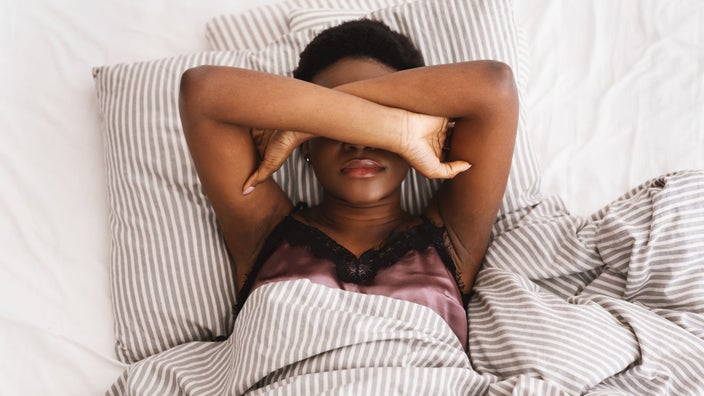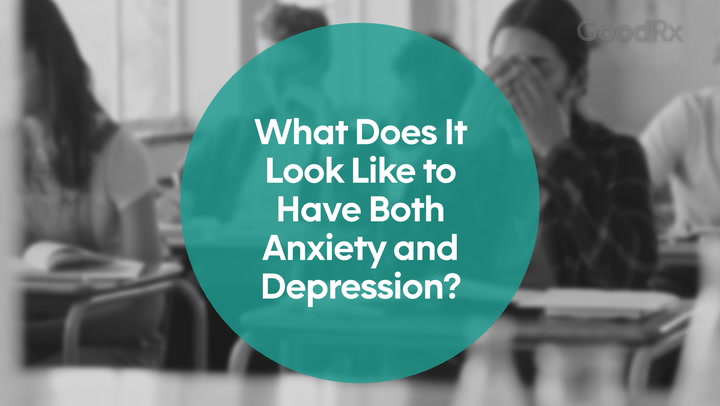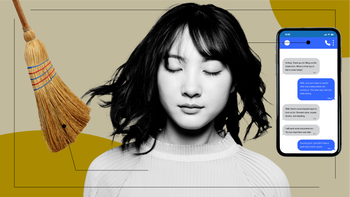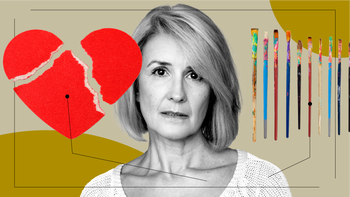
How to Manage Sleep Anxiety and Get a Good Night’s Rest
Key takeaways:
Sleep anxiety is when you feel worried, scared, or anxious about being able to sleep well at night.
Sleep anxiety can be caused by insomnia, and it can also make insomnia worse.
Therapy, lifestyle changes, and medications can all help to get your sleep anxiety under control.

It feels terrific when you get a good night’s sleep — and pretty rotten when you don’t. Not only is it tiring when you don’t sleep well, but it can also be frustrating, stressful, and even anxiety-provoking. You may even start to feel like you’re “bad” at sleeping or dread getting into bed at night.
If this sounds familiar — and you worry a lot about sleeping — you might have sleep anxiety. Sleep anxiety is worry or fear about going to bed, or about falling or staying asleep. It’s kind of like stage fright, but for sleeping. And for some people, sleep anxiety can become so severe that it actually starts to get in the way of daily life.
But here’s the good news: Sleep anxiety is common and treatable. You can overcome it. After all, humans have evolved over thousands of years to be great sleepers. Sometimes, we just need a little help getting back on track.
Fast, affordable ED treatment from GoodRx
Build a personalized treatment plan and get erectile meds delivered discreetly. Subscriptions start at just $18/mo.

GoodRx is NOT insurance. Cancel anytime. GoodRx Health information and resources are reviewed by our editorial staff with medical and healthcare policy and pricing experience. See our editorial policy for more detail. We also provide access to services offered by GoodRx and our partners when we think these services might be useful to our visitors. We may receive compensation when a user decides to leverage these services, but making them available does not influence the medical content our editorial staff provides.
Ready to learn more? Read on for more information about sleep anxiety, insomnia, and how they’re connected. We’ll also help you understand how sleep anxiety is treated, and how you can get back to sleeping well at night.
What is sleep anxiety?
Sleep anxiety is worry or fear about going to sleep at night. It’s different from feeling anxious while you’re in bed. It’s actually worry about sleeping.
When you have sleep anxiety, you might think:
I won’t be able to fall asleep tonight
I’ll be awake for hours before I can fall asleep
I’ll wake up a lot during the night
I’ll be tossing and turning all night long
I’ll only be able to get a few hours of sleep
I’ll be so tired tomorrow that I won’t be able to function
I’m a bad sleeper, or there must be something “wrong” with me
There’s nothing I can do about my sleep problems
Like many other types of anxiety, sleep anxiety can have physical symptoms, too. For example, when you’re feeling anxious you might experience:
Fast heartbeat
Shallow breathing
Muscle tension
Physical restlessness
Upset stomach
Though sleep anxiety isn’t an “official” medical diagnosis, a poor night of sleep can definitely make you feel more stressed the next day. And as we’ll see below, sleep anxiety can actually make your nighttime sleep worse — by creating an ongoing cycle of anxiety and insomnia.
Can sleep anxiety cause insomnia?
Yes. Sleep anxiety can cause insomnia. This is because stress and anxiety can disrupt sleep.
But the truth is, it can be hard to tell which comes first: anxiety or insomnia. Anxiety can cause sleeping problems, but insomnia can also cause daytime anxiety. This means that anxiety and insomnia can make each other worse.
Here’s an example of how anxiety and insomnia can create a cycle of not sleeping well:
You go to bed, feeling anxious about getting to sleep.
As you lay in bed, your anxiety makes it harder to fall and stay asleep.
You wake up the next day feeling even more anxious and stressed.
You go to bed that night, and the cycle starts again.
Researchers have also found that the brains of people who haven’t slept well look very similar to the brains of people with anxiety disorders. The sleep-deprived brain produces more stress hormones like cortisol, which can make you feel more on edge.
Do I have insomnia?
Insomnia is a health condition where you have trouble going to sleep, staying asleep, or both.
Symptoms of insomnia can include:
Trouble falling asleep
Trouble staying asleep
Waking up early and not being able to get back to sleep
Daytime drowsiness or tiredness
Not feeling rested after a night’s sleep
Trouble concentrating or remembering things
Injuries or accidents related to being tired
Moodiness or irritability because of fatigue
You may have trouble sleeping because of a stressful situation, and your insomnia may only last for a few days or weeks. But insomnia can also be chronic, meaning you could have trouble sleeping for months.
Sleep anxiety (and anxiety in general) is one possible cause of insomnia. But there are many others, including certain medical conditions and lifestyle habits, like drinking too much caffeine. Insomnia can also be a side effect of some medications.
Why is it important to treat sleep anxiety?
Sleep anxiety can interfere with sleep. And we know that sleep is very important for your health. Sleep helps you learn and form new memories. It also helps remove toxins from your brain that build up while you’re awake. After a sleepless night, it can be harder for you to concentrate on work or school, and you’re more at risk for accidents or injuries.
A lack of sleep or poor sleep can raise your risk for anxiety disorders or make them worse. And over a long time, they can also raise your risk for many health problems, including:
In short, sleep is important for both your physical and mental health. Not only does a regular good night’s sleep help improve your anxiety, but it can also make you feel more alert and refreshed and help you function well in everyday life.
Where can I get help for sleep anxiety?
If you experience sleep anxiety, or your anxiety prevents you from falling asleep at night, you can see your medical provider or a mental health professional. Your provider can help you understand whether you have sleep anxiety, another anxiety disorder, insomnia, or a combination.
Your healthcare provider can also look into whether something else might be disrupting your sleep, like a medication side effect or medical problem. You might believe anxiety is behind your poor sleep. But just in case, your provider will rule out other possible causes first. These can include:
Medications: Certain medications, including popular ones for ADHD, asthma, and pain, can cause insomnia. Even antidepressants you may have been prescribed for anxiety can have this side effect.
Physical illnesses: Symptoms of health conditions related to the heart, blood vessels, lungs, thyroid, stomach, and brain can keep you awake at night.
Habit-forming substances: Alcohol and other drugs with a risk for dependency and addiction, caffeine, and nicotine can also make it hard to get a good night’s rest.
Your provider may also ask about your daily habits and see if anything about them is making it hard for you to sleep. For example, traveling often for work or working overnights can offset your circadian rhythm (an internal “clock” that regulates your sleep-wake cycle). Eating late in the evenings can lead to acid reflux or discomfort when lying down. Watching TV or being on your computer or phone before you go to bed can also make it hard to fall asleep.
Additionally, your provider may talk to your spouse or partner to get a sense of how you are when you sleep. Some people wake up many times a night because of sleep apnea, a health condition in which your breathing stops and starts during sleep. Or they might have other sleep disorders, such as restless leg syndrome, which creates an uncontrollable urge to move your legs. This urge typically happens while you are trying to go to sleep. You may not notice some of these, but a partner will.
If you have any of these conditions, treating them may help you sleep better at night — and relieve your sleep anxiety.
How is sleep anxiety treated?
If you're anxious about sleeping at night, don’t worry: You can learn to sleep well again. And once you’re sleeping better, you may find that your sleep anxiety will go away.
So, where do you begin? If your sleep problems aren’t caused by a health problem or medication, the best place to start is with good sleep habits and therapy.
This first-choice treatment for ongoing insomnia is cognitive-behavioral therapy for insomnia (CBT-I). This is a special type of CBT where you learn how to manage your sleep-related thoughts and behaviors. CBT-I uses exercises and behavioral changes to help you:
Think about yourself — and your sleep patterns — in a more positive way
Sleep better at night
Keep your sleep anxiety under control
Manage anxious or racing thoughts at night
Reinforce your body’s sleep-wake cycle
Reinforce the connection between being in bed and being asleep
Learn how to use good sleep hygiene practices in your daily life
You can do CBT-I with a therapist or even on your own with a book or workbook. There are online courses that can help as well.
CBT-I also focuses on good sleep habits (sleep hygiene). This may include:
Getting up at the same time every day
Keeping your bedroom quiet, cool, and dark
Not using screens before bedtime or while in bed
Avoiding caffeinated drinks in the afternoon or evening
Using your bed only for sleep or sex
Not taking naps during the day
Avoiding bright or blue light at bedtime
Getting exercise and sunlight during the day
Can medication treat sleep anxiety?
In some cases, medication can also be helpful for sleep anxiety — especially when it’s used along with CBT-I. There are some types of medications that relieve anxiety. Other medications can help you fall or stay asleep. And some medications even do both at the same time.
The type of medication your provider recommends will depend on your age, health, what kind of symptoms you’re having, side effects, medication costs, and other factors.
That said, here are some of the medications available to treat insomnia and sleep anxiety:
Sleep aids: These include prescription medications such as eszopiclone (Lunesta), zolpidem (Ambien), zolpidem ER (Ambien CR), and zaleplon (Sonata). They can help you fall or stay asleep. But they do come with side effects and can be habit-forming.
Antidepressants: Some antidepressants, such as selective serotonin reuptake inhibitors (SSRIs) and serotonin-norepinephrine reuptake inhibitors (SNRIs), can cause problems with sleep. But, some antidepressants, such as trazodone (Desyrel) and doxepin (Sinequan), can be used at low doses to help you sleep. Antidepressants can also be used to directly treat your anxiety.
Melatonin-like medications: These medications include ramelteon (Rozerem). They mimic a natural substance that your body makes called melatonin, which helps regulate your sleep-wake cycle.
Can CBD help my sleep anxiety?
CBD (cannabidiol), a chemical from Cannabis plants, is an herbal supplement advertised as a treatment for anxiety and insomnia — along with many other conditions. Several studies have looked at the use of CBD to treat both anxiety and insomnia. The results have been somewhat positive. But, there are a couple of things to keep in mind:
CBD isn’t approved by the FDA, so it’s not regulated. This means you can’t be sure the amount of CBD on a label is the dose you’re actually getting.
CBD doesn’t cause a “high” like tetrahydrocannabinol (THC). But many CBD products may have more THC than advertised, which can trigger anxiety.
CBD doesn’t have a clear dose to treat either anxiety or insomnia. We also don’t know much yet about CBD’s side effects and interactions with other medications.
The bottom line
Sleep anxiety and insomnia can be a vicious cycle: Poor sleep makes you anxious, and then your anxiety fuels your insomnia. But if you’re dealing with sleep anxiety and worry about getting a good night of sleep, there are steps you can take to get back on track. Cognitive-behavioral therapy for insomnia (CBT-I), good sleep hygiene, and medications can all help you sleep better at night — and ultimately get your sleep anxiety under control.
Why trust our experts?


References
American Academy of Sleep Medicine. (2017). New guideline.
American Psychological Association. (2013). Stress and sleep.
Asnis, G., et al. (2012). Treatment of insomnia in anxiety patients. Psychiatric Times.
Babson, K., et al. (2017). Cannabis, cannabinoids, and sleep: A review of the literature. Current Psychiatry Reports.
DiSalvo, D. (2018). Understanding the link between sleep and anxiety, and other findings from the neuroscience of sleep. Forbes.
Duke University. (2015). Humans evolved to get better sleep in less time. Science Daily.
Ho, F. Y-Y., et al. (2014). Self-help cognitive-behavioral therapy for insomnia: A meta-analysis of randomized controlled trials. Sleep Medicine Reviews.
Kaczkurkin, A. (2015). Cognitive-behavioral therapy for anxiety disorders: An update in the empirical evidence. Dialogues in Clinical Neuroscience.
National Heart, Lung, and Blood Institute. (2022). Why is sleep important?.
Neurological Institute of Neurological Disorders and Stroke. (2022). Brain basics: Understanding sleep.
Schutte-Rodin, S., et al. (2008). Clinical guideline for the evaluation and management of chronic insomnia in adults. Journal of Clinical Sleep Medicine.
Shannon, S., et al. (2019). Cannabidiol in anxiety and sleep: A large case series. The Permanente Journal.
Smith, R. (2015). Humans evolved to get better sleep in less time. ScienceDaily.
VanDolah, H. J., et al. (2019). Clinicians’ guide to cannabidiol and hemp oils. Mayo Clinic Proceedings.
For additional resources or to connect with mental health services in your area, call SAMHSA’s National Helpline at 1-800-662-4357. For immediate assistance, call the National Suicide Prevention Lifeline at 988, or text HOME to 741-741 to reach the Crisis Text Line.

























